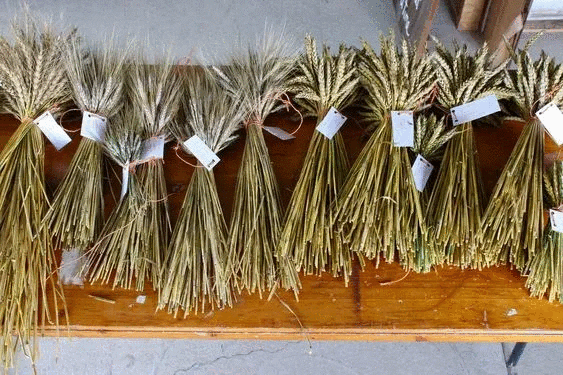Shelley Spruit founded Against the Grain five years ago, with a focus on the re-establishment of heritage grains for human consumption, with an emphasis on the local market. A fourth generation farmer, Shelley says she knows nothing else but growing and preparing food from their gardens and land. She grows whole grains and ancient varieties, adapted for the local environment, as many otherwise local food systems are missing locally grown grain. She selects grains from around the world, collecting stories and encouraging diversity.
 Shelley’s husband Tony was born and raised on Spruit road. The couple moved to the area over 25 years ago. They founded Winchelsea Farms, and operated that business for 13 years, promoting locally sourced food, and feeding people from across the counties in their renovated barn. In 2009, they sold that business. All tolled, they have been farming in the area for 33 years, and have always grown some sort of grains. Over the last 7 years, they have developed an interest in heritage grain, so they started looking into the value and opportunities for older varieties of grains. Heirloom grains are important for a variety of reasons, including: expanding and maintaining the biodiversity of agriculture; honouring and perpetuating food history; preserving a diversity of flavour; ensuring seed sovereignty; and protecting farmers’ rights to save and re-use seeds, and breed and exchange diverse and open-source seeds that are not patented, genetically modified, or owned or controlled by seed companies.
Shelley’s husband Tony was born and raised on Spruit road. The couple moved to the area over 25 years ago. They founded Winchelsea Farms, and operated that business for 13 years, promoting locally sourced food, and feeding people from across the counties in their renovated barn. In 2009, they sold that business. All tolled, they have been farming in the area for 33 years, and have always grown some sort of grains. Over the last 7 years, they have developed an interest in heritage grain, so they started looking into the value and opportunities for older varieties of grains. Heirloom grains are important for a variety of reasons, including: expanding and maintaining the biodiversity of agriculture; honouring and perpetuating food history; preserving a diversity of flavour; ensuring seed sovereignty; and protecting farmers’ rights to save and re-use seeds, and breed and exchange diverse and open-source seeds that are not patented, genetically modified, or owned or controlled by seed companies.
When Shelley started Against the Grain, and began researching heirloom varieties of seeds, she only had a handful of some of the seeds she wanted to try to grow. She grew them and saved them, then grew and saved them again the next year, one seed at a time. In the third year of growing, she found the winner, which has become the cornerstone of Against the Grain. Ancient Amber Wheat is now used by professional bakers all across Canada. Against the Grain has grown, literally, one seed at a time.
Big farms are getting bigger. In North Dundas, many of the smaller dairy farmers are selling out. But in the past five years, Shelley is pleased to see a growing interest from people who don’t have a farming background wanting to learn how to grow their food, and how to develop sustainable businesses that provide an income for their families.
There is no one-and-only way to farm. Through changing habits, some farmers manage to create habitat space for at-risk species, and some can retire marginal land. Some farmers can practice no-till farming, and some can plant green cover crops. Each of us must be willing to try something that is beneficial to our land, our business and the environment.
Many of Shelley’s clients at Against the Grain come from outside the area. A surprising number don’t know about Stormont, Dundas, & Glengarry. It’s a beautiful area, with rich agricultural land and communities. We need education and more awareness in order to bring people out here from the surrounding cities. Our leaders could look to Prince Edward County to see an excellent example of agriculture tourism, and agriculture events that promote regional food.
There are few regulations governing how many of our treelines and acres of forested area can be cut down. This is a big concern for many people, including Shelley. In South Dundas, we can see the long-term negative effects from clearing the trees from fence rows, and removing areas of bush. Removing trees leads to wind erosion, loss of habitat for species, and changes to the water table. We need to think of the long-term effects. Each of us needs to take responsibility for the health of the environment, and to take responsibility for understanding the importance of trees. Seven years ago, when Shelley and Tony purchased the 50 acres they currently steward, they planted over 300 native trees and shrubs into the fence rows and marginal grasslands. She knows that they will not see all of them mature, but it is their way of giving back to the generations to come.
Education and awareness are key to promoting sustainability, supporting heritage food, and understanding the role of regenerative agriculture. The more people are exposed to the positive and negative impacts of their food choices, the better chance we have of making a positive change for the good of our generation and those to come. Each of us has a responsibility to participate in the change we want to see. Healthy communities go hand in hand with a healthy local food economy. Everyone benefits when we pay attention to local agriculture. Farmers are resilient and adaptable. They have grit. No matter what happened last fall, the farmer still plants the seed the following spring. Farmers’ work ethic, optimism, and willingness to keep going will always prevail.
Against the Grain Farms: www.againstthegrainfarms.ca, 613-406-1969
